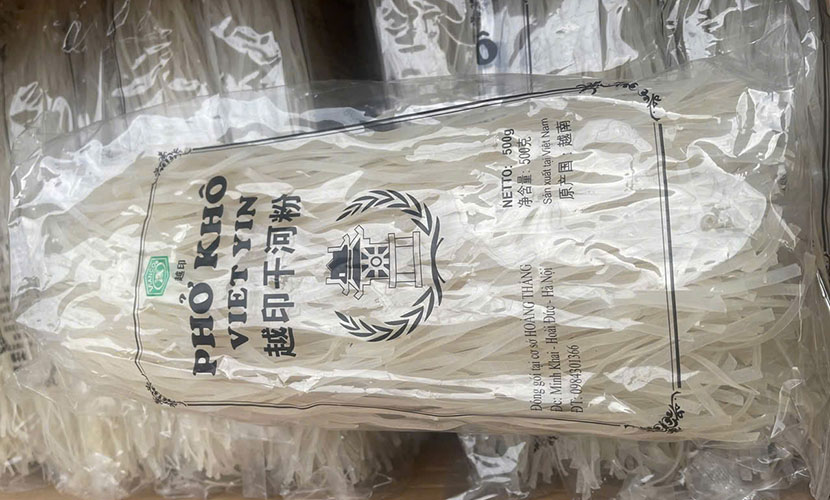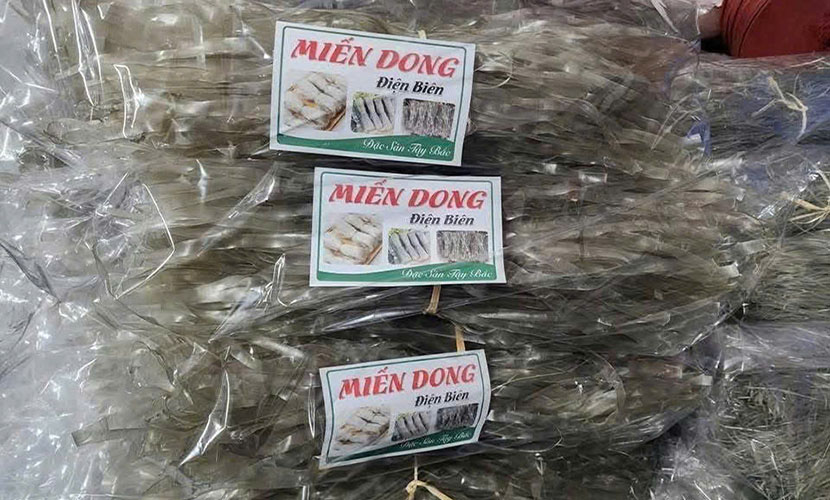
In recent days, exporters of Vietnamese rice noodles have been busy preparing for year-end export orders. Focusing on diversifying markets and improving product quality are their main strategies. With rice prices dropping significantly, they are confidently setting high goals for this year.
In addition to traditional products, they have been developing new items such as dragon fruit noodles, no-soaking rice paper, and vegetable rice paper. All these items are attracting increasing interest from international customers.
Mr. Duy is general director from one of the pioneers in bringing no-soaking rice paper to international markets. He said that over the past three years, the company’s export volume has grown by more than 10% annually.

Vietnamese rice noodles (Bún gạo lứt Việt Nam)
According to Mr. Duy, the company exports a wide range of Vietnamese rice noodles. Specifically, they include shrimp salt, chili salt sauce, and spring roll rice paper. Especially, no-soaking rice paper is proving very popular internationally.
This no-soaking rice paper product has already been available to more than eight countries. These markets include Japan, South Korea, the United States, Australia, Canada, Taiwan, Thailand, and Malaysia. Moreover, international customers have proposed collaborating to develop new product lines like vegetable rice paper.
“In the next three years, we aim to expand to at least five new markets. We will focuse on countries with high demand such as the US, Australia, and the Middle East. Specifically, in 2025, our company targets a revenue growth of over 20% compared to 2024,” Mr. Duy stated.

Vietnamese dried pho (Phở khô Việt Nam)
Another experienced exporter said that the company exports about 600 tons of rice paper, 500 tons of dried noodles, and 400 tons of dried pho each year. In which, South Korea, Japan, and Europe accounts for about 80% of total exports and show stable growth.
Mr. Duy added that the export market continues to grow steadily due to rising market demand. Accordingly, the company has targeted a 20% revenue increase from this channel in the near future. The company has competitive production costs and process innovations that meet the strict requirements of demanding markets.
Specifically, the company ensures that all products meet international quality standards such as FSSC 22000, Halal, and FDA certifications. It has promoted campaigns that focuses on top markets like Japan and South Korea to seek partners. For the domestic market, the company is cooperating with more distributors and enhancing its presence on e-commerce platforms.

Dien Bien glass noodles (Miến dong Điện Biên)
“Consumer preferences are always changing, exporters of Vietnamese rice noodles must adapt, especially in major markets. Additionally, the price of input materials, mainly rice, has dropped significantly compared to before. This is an advantage that allows businesses to confidently offer high-quality rice noodles at competitive prices,” Mr. Duy added.
Sharing the same view, a representative from another business said that rice (the main raw material) is now being purchased at 6,500–8,000 VND per kilogram depending on the type, a sharp decrease compared to last year and the record highs of 2023. This is a major advantage for manufacturers of rice-based products.
“Raw materials account for around 70% of production costs. Therefore, when raw material prices are stable, it gives Vietnamese companies a great advantage to confidently expand production lines and better compete with major international players. Thanks to this, Vietnam’s export market for products like noodles, vermicelli, rice paper, and pho is expected to grow favorably in the near future.”
Vietnamese source: https://tuoitre.vn/gia-gao-giam-manh-doanh-nghiep-xuat-khau-bun-pho-banh-trang-ky-vong-thang-lon-20250728133120123.htm
